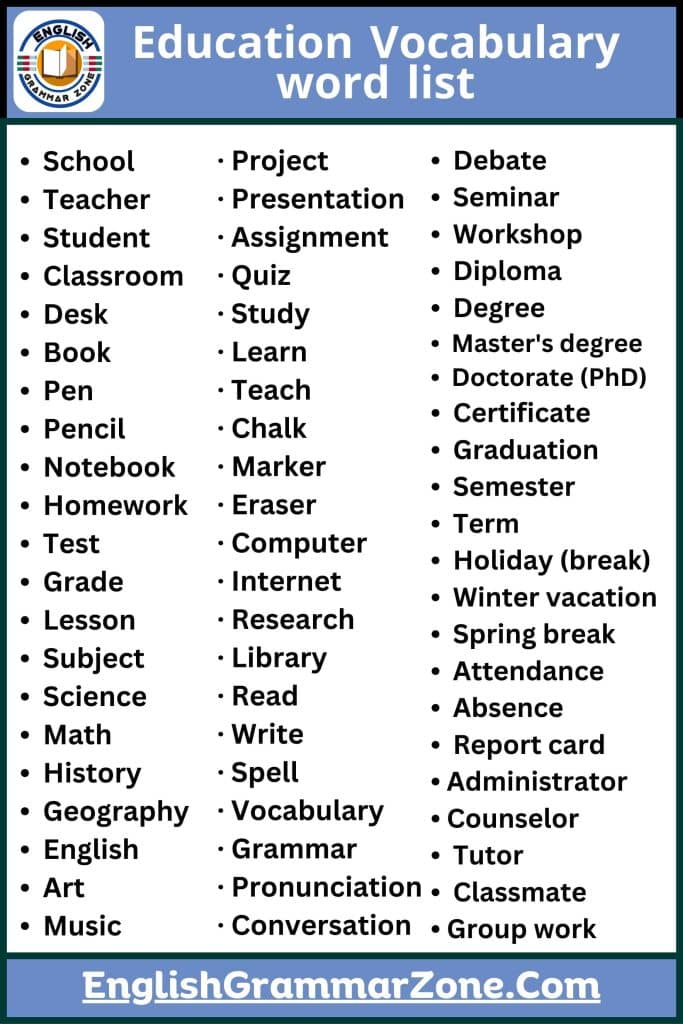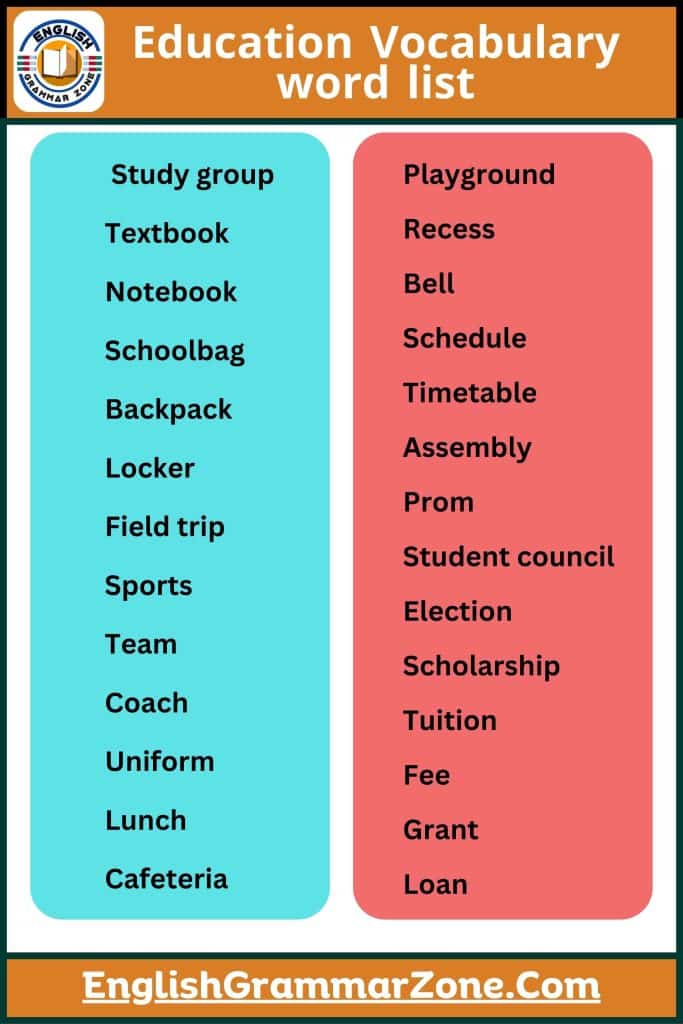Learning education vocabulary is essential for students, teachers, and anyone interested in discussing school, learning, and academic topics in English. In this blog post, you’ll discover 100+ important education-related words that will help you talk about subjects, exams, classrooms, and more with confidence. Whether you’re a beginner or just looking to expand your vocabulary, this list will make learning easier and more enjoyable.

Education vocabulary words list
- School
- Teacher
- Student
- Classroom
- Desk
- Book
- Pen
- Pencil
- Notebook
- Homework
- Test
- Grade
- Lesson
- Subject
- Science
- Math
- History
- Geography
- English
- Art
- Music
- Physical Education (PE)
- Project
- Presentation
- Assignment
- Quiz
- Study
- Learn
- Teach
- Board (blackboard or whiteboard)
- Chalk
- Marker
- Eraser
- Computer
- Internet
- Research
- Library
- Read
- Write
- Spell
- Vocabulary
- Grammar
- Pronunciation
- Conversation
- Debate
- Seminar
- Workshop
- Diploma
- Degree
- Bachelor’s degree
- Master’s degree
- Doctorate (PhD)
- Certificate
- Graduation
- Semester
- Term
- Holiday (break)
- Summer vacation
- Winter vacation
- Spring break
- Attendance
- Absence
- Report card
- Principal
- Headmaster/Headmistress
- Administrator
- Counselor
- Tutor
- Classmate
- Group work
- Collaboration
- Study group
- Textbook
- Notebook
- Schoolbag
- Backpack
- Locker
- Field trip
- Extracurricular activities
- Sports
- Team
- Coach
- Uniform
- Lunch
- Cafeteria
- Playground
- Recess
- Bell
- Schedule
- Timetable
- Assembly
- Graduation ceremony
- Prom
- Student council
- Election
- Scholarship
- Tuition
- Fee
- Grant
- Loan

100+ Education Vocabulary Words with Example Sentences
Expanding your education vocabulary is essential for effective communication in school and academic settings. Below are important education-related words along with example sentences to help you understand their usage.
Basic School-Related Words
- School – I go to school every day at 8 AM.
- Teacher – Our English teacher explains grammar very well.
- Student – The student answered the question correctly.
- Classroom – The classroom was decorated with colorful charts.
- Desk – I keep my books and notebook on my desk.
Stationery & Study Materials
- Book – I borrowed a science book from the library.
- Pen – Please use a blue pen to write your answers.
- Pencil – Draw a picture using a pencil.
- Notebook – I write my daily notes in my notebook.
- Homework – Our teacher gave us math homework today.
Exams & Assessments
- Test – We have a science test tomorrow.
- Grade – She got an A grade in English.
- Lesson – Today’s lesson is about world history.
- Subject – My favorite subject is geography.
- Quiz – The teacher gave us a surprise quiz.
School Subjects
- Science – Science helps us understand how the world works.
- Math – I find math problems very interesting.
- History – We learned about ancient civilizations in history class.
- Geography – Geography teaches us about different countries.
- English – I enjoy reading English literature.
- Art – The art teacher showed us how to paint landscapes.
- Music – We learned a new song in music class.
- Physical Education (PE) – PE class helps us stay active and healthy.
Classroom Activities & Assignments
- Project – We are working on a group science project.
- Presentation – She gave a presentation about global warming.
- Assignment – I finished my history assignment on time.
- Study – I study for two hours every evening.
- Learn – We learn new things every day in school.
- Teach – Our teacher loves to teach grammar.
Classroom Items & Tools
- Board (blackboard or whiteboard) – The teacher wrote the topic on the whiteboard.
- Chalk – We use white chalk to write on the board.
- Marker – She used a red marker to highlight important words.
- Eraser – I need an eraser to remove my mistakes.
- Computer – We use the computer lab for our research projects.
- Internet – The school provides free internet for students.
- Research – We did research on renewable energy for our project.
Language Learning
- Library – I borrowed a novel from the library.
- Read – I love to read mystery books.
- Write – We have to write an essay for homework.
- Spell – Can you spell your name correctly?
- Vocabulary – Learning new vocabulary helps improve communication.
- Grammar – Proper grammar makes sentences clear and correct.
- Pronunciation – Good pronunciation is important for speaking English.
- Conversation – We had an interesting conversation in English class.
- Debate – Our class had a debate on environmental pollution.
- Seminar – We attended a seminar on career guidance.
- Workshop – The writing workshop helped me improve my skills.
Higher Education & Certifications
- Diploma – He received a diploma after completing high school.
- Degree – She is studying for a degree in engineering.
- Bachelor’s degree – A bachelor’s degree usually takes four years to complete.
- Master’s degree – He is pursuing a master’s degree in education.
- Doctorate (PhD) – She earned a PhD in physics.
- Certificate – I received a certificate for completing the course.
- Graduation – We will celebrate our graduation next month.
Academic Year & Breaks
- Semester – This semester ends in December.
- Term – Our school term is divided into three parts.
- Holiday (break) – We are on a two-week holiday.
- Summer vacation – Summer vacation starts in June.
- Winter vacation – Our winter vacation lasts for two weeks.
- Spring break – We are going on a trip during spring break.
School Rules & Administration
- Attendance – Good attendance is important for learning.
- Absence – His absence was due to illness.
- Report card – I received my report card today.
- Principal – The principal gave a speech at the assembly.
- Headmaster/Headmistress – The headmistress welcomed the new students.
- Administrator – The administrator manages the school records.
- Counselor – The counselor helps students with personal and academic problems.
- Tutor – I have a math tutor to help me with algebra.
Classmates & Group Activities
- Classmate – My classmate helped me with my homework.
- Group work – We completed our assignment through group work.
- Collaboration – Collaboration is important for teamwork.
- Study group – We formed a study group to prepare for exams.
School Supplies & Facilities
- Textbook – I forgot my English textbook at home.
- Notebook – My notebook is full of notes.
- Schoolbag – I carry my books in my schoolbag.
- Backpack – My backpack is heavy with books.
- Locker – I keep my sports shoes in my locker.
Extracurricular & Social Activities
- Field trip – Our class went on a field trip to the museum.
- Extracurricular activities – I participate in many extracurricular activities.
- Sports – I love playing sports after school.
- Team – Our basketball team won the tournament.
- Coach – Our coach taught us new football techniques.
School Life & Daily Routine
- Uniform – We wear a uniform to school every day.
- Lunch – We eat lunch in the cafeteria.
- Cafeteria – The cafeteria serves healthy food.
- Playground – We play soccer in the playground.
- Recess – Recess is my favorite time of the day.
- Bell – The bell rings at the end of the class.
- Schedule – My class schedule is very busy.
- Timetable – We follow a timetable for all subjects.
School Events & Celebrations
- Assembly – The school assembly takes place every morning.
- Graduation ceremony – The graduation ceremony was a memorable event.
- Prom – Our prom night was amazing.
- Student council – The student council organizes school events.
- Election – The election for class president is next week.
School Fees & Financial Support
- Scholarship – I received a scholarship for my good grades.
- Tuition – The tuition fee is quite expensive.
- Fee – We paid the school fee on time.
- Grant – He received a grant to study abroad.
- Loan – Many students take a loan for higher education.
FAQs on Education Vocabulary
1. What is the vocabulary of education?
The vocabulary of education includes words and phrases commonly used in schools, classrooms, and academic discussions. These words cover topics like subjects (math, science), school-related activities (homework, exam), and learning concepts (curriculum, syllabus).
2. What are the 20 words of vocabulary?
- Classroom
- Student
- Teacher
- Subject
- Homework
- Exam
- Grade
- Curriculum
- Syllabus
- Lecture
- Assignment
- Textbook
- School
- College
- University
- Learning
- Education
- Scholarship
- Diploma
- Graduation
3. Why is vocabulary important in education?
Vocabulary is crucial in education because it helps students understand lessons, express their thoughts clearly, and improve their reading and writing skills. A strong vocabulary also enhances comprehension and academic success.
4. Why is vocabulary important?
Vocabulary is important because it allows people to communicate effectively, understand new concepts, and improve critical thinking. It is essential for language development and academic growth.
5. How to best teach vocabulary?
The best ways to teach vocabulary include:
- Using flashcards and visual aids
- Encourage reading and discussion
- Practicing with word games and quizzes
- Teaching words in context through storytelling
- Repeating and reviewing words regularly

